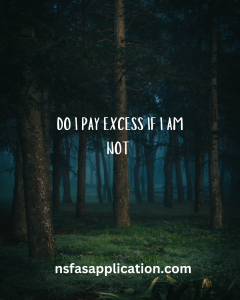Do I pay excess if I am not

Do I pay excess if I am not
Do You Pay Excess if You’re Not at Fault in South Africa?
If you’re a South African car owner, you might be concerned about whether you’ll be liable for excess costs if you’re involved in an accident that wasn’t your fault. This article aims to provide clarity on this issue and offer valuable insights on what to anticipate.
The General Rule
In South Africa, the general rule is that you’ll still have to pay excess even if you’re not at fault in an accident. This is because excess is a standard component of most insurance policies, and it’s usually payable regardless of who’s at fault.
However, There Are Some Exceptions
While the general rule is that you’ll still have to pay excess, there are some exceptions to this rule. For example:
-
If the other party is uninsured: If the other party involved in the accident is uninsured, you may not have to pay excess. In this case, your insurer may waive the excess or reimburse you for the excess amount.
-
If the other party is identified and insured: If the other party involved in the accident is identified and insured, your insurer may claim the excess amount from the other party’s insurer. In this case, you may not have to pay excess.
-
If you have a waiver of excess: Some insurance policies offer a waiver of excess, which means that you won’t have to pay excess in certain circumstances. If you have this type of waiver, you may not have to pay excess even if you’re not at fault.
What to Do If You’re Not at Fault
If you’re involved in an accident that wasn’t your fault, it’s essential to follow the correct procedures to ensure that you’re not unfairly penalized. Here are some steps to take:
-
Report the accident to the police: Make sure to report the accident to the police and obtain a case number.
-
Notify your insurer: Inform your insurer about the accident as soon as possible.
-
Provide documentation: Provide your insurer with all relevant documentation, including the police report and witness statements.
-
Check your policy: Review your insurance policy to see if you have a waiver of excess or any other provisions that may apply.
In conclusion, while the general rule is that you’ll still have to pay excess even if you’re not at fault in an accident, there are some exceptions to this rule. If you’re involved in an accident that wasn’t your fault, it’s essential to follow the correct procedures and check your policy to see if you have any provisions that may apply.
Related Links
What does comprehensive coverage mean?
Do I need both collision and comprehensive?
Does comprehensive insurance cover engine failure?
What does fully comprehensive cover include?
Can you drive a car if you are fully comp?
What is included in a comprehensive?
What is personal accident cover?